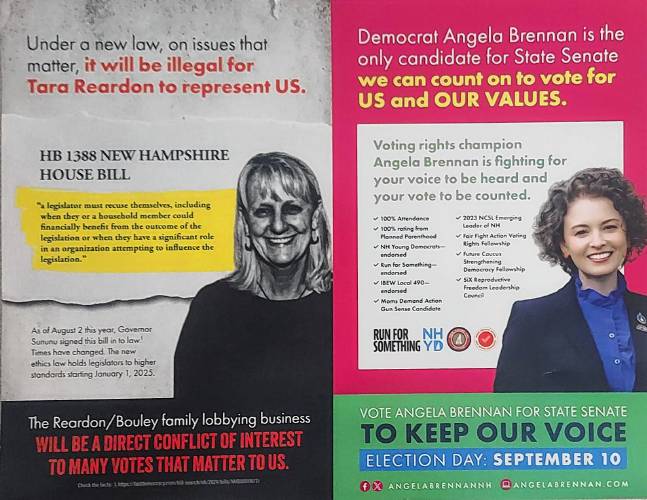Under new law, Tara Reardon could not vote on issues her husband lobbies for, critics say
|
Published: 09-02-2024 10:32 AM
Modified: 09-03-2024 9:35 AM |
Tara Reardon, whose spouse is lobbyist and former Concord mayor Jim Bouley, won’t be able to vote on any legislation that involves her husband’s clients if she is elected to the State Senate due to a recent change to state law, her critics say.
“Under a new law, on issues that matter, it will be illegal for Tara Reardon to represent us,” reads a mailer sent to homes in Bow, Concord and Hopkinton by rival Democrat Angela Brennan over the weekend.
The three-way primary for the Senate District 15 seat includes Brennan, who just finished her first term as a state representative for Bow; Rebecca McWilliams, who served three terms in the House serving Concord; and Reardon, who served more than a dozen years as a state lawmaker starting in 1997.
It’s the state’s most competitive Senate primary, and Reardon has collected high-profile endorsements, has twice the campaign funds of her opponents, and is well known in the Capital City, where she’s lived her entire life. She says her experience and relationships make her the right choice to fill the role.
Yet her opponents – both from a different generation of Democratic lawmakers – say Reardon’s marriage to a lobbyist will limit her ability to serve.
“Times have changed,” Brennan states in her ad.
House Bill 1388, which passed this legislative session, requires lawmakers to withdraw from votes when they have a conflict of interest, which includes the financial interest of family members. It was signed into law by Gov. Chris Sununu on Aug. 2 and takes effect in January.
Reardon dismissed the new law and the criticism as a distraction.
Article continues after...
Yesterday's Most Read Articles
 New Hampshire legalizes public alcohol consumption in designated ‘social districts’
New Hampshire legalizes public alcohol consumption in designated ‘social districts’
 New Hampshire providers brace for Medicaid changes that reach beyond healthcare
New Hampshire providers brace for Medicaid changes that reach beyond healthcare
 Warner town administrator granted restraining order against selectman
Warner town administrator granted restraining order against selectman
 Hotel makeover underway in downtown Concord
Hotel makeover underway in downtown Concord
 Opinion: Dear Gov. Ayotte, let’s talk about the books
Opinion: Dear Gov. Ayotte, let’s talk about the books
 State rules Epsom must pay open-enrollment tuition to other school districts, despite its refraining from the program
State rules Epsom must pay open-enrollment tuition to other school districts, despite its refraining from the program
“I’m on the ballot, not my husband, not my family — and I trust that voters who know my record and know my agenda will not be distracted by my opponent and her supporters trying to derail the campaign,” Reardon said.
Brennan’s only comment on the dispute was, “The voters will decide.”
McWilliams provided a written statement when asked for comment.
“I voted for the legislative ethics reform bill to ensure transparency and uphold public trust,” she said. “Research your candidates and who they are connected to — who will they call about a challenging issue?”
Reardon’s resume includes time on the Concord City Council and School Board, and her current post as a Merrimack County Commissioner. Her spouse is a lobbyist and partner at the Dennehy and Bouley lobbying firm. His clients include Casella, a waste disposal company looking to expand landfills in the North Country, associations of long-term healthcare providers, automotive dealers and veterinarians, and The Brook – the largest casino in New Hampshire and a top donor to Reardon’s campaign.
HB 1388 does two things: it adds a requirement for legislators to recuse themselves from voting when they have a financial conflict of interest and defines more specifically what counts as such a conflict. The bill put into writing what had been more of a political expectation of lawmakers in the past.
Previously, legislators were not legally required to recuse themselves from votes where they had financial conflicts of interest, said Vanessa Sheehan, the prime sponsor of the bill, during a Senate hearing.
Precedent only required officials in New Hampshire to recuse themselves in situations where their conflict of interest could change the outcome of their work — and it left much of that decision up to the officials themselves, according to Amy Spencer, a Manchester-based counsel with Nixon Peabody’s government investigations and white collar defense practice groups.
Prior to the new law, “there’s not a lot of precedent on legislative recusal at all and the standards for it,” said Spencer, who has worked in election law for several years. “That was likely one of the motivating factors for the passage of HB 1388.”
Last term, the Legislative Ethics Committee was asked to weigh in on whether lawmakers whose employers — specifically the state university system and an organization that helps residents access abortions — have lobbied in the State House should recuse from certain votes.
A key legislative issue that, if Reardon were elected, could put this new law to the test would be landfill expansion.
Casella, a Vermont-based company behind multiple controversial and legally contested efforts at landfill expansion in the North Country, is a client of Bouley. Last term, the Senate killed multiple bills that would have restricted landfill siting and the burial of out-of-state trash in New Hampshire.
In an earlier interview, Reardon said she’s anti-landfill and would vote against expansion. She posed that potential conflict to her critics if she were to vote on landfill rules.
“So if I’m against Casella, do you want me to declare a conflict, or do you want me to vote against it?” she said. “If it’s better for all purposes that I just avoid the appearance and don’t vote on that, that would be too bad, because I’m opposed to it.”
Lobbyists, as defined by New Hampshire Employment Security, “contact and confer with members of legislature to persuade them to support legislation favorable to clients’ interests.”
Reardon argued that, because she wouldn’t directly financially benefit from legislation relating to Dennehy and Bouley clients, she would not have a conflict requiring her to recuse herself from votes.
“Nobody in the lobbying business these days gets a bonus if they pass a bill or don’t pass a bill. A lobbyist’s job is to walk a client through the process,” she said.
State law says that a conflict of interest arises when a lawmaker has “a special interest in any matter which could directly or indirectly affect or influence” their legislative performance. New language defines a “special interest” as “any financial or non-financial personal interest in the outcome of a matter that is the subject of official activity, distinct from and greater than the interests of the public at large.” Such situations include “where a legislator or household member... could stand to gain or lose anything of material value as a result of the official activity.”
The new law adds a three-part test for recusal when a conflict of interest exists.
Lawmakers will now be required to withdraw from “any official legislative activity” when they or anyone in their household are paid by an organization, exercise “substantial influence over the affairs of the organization,” and “the organization has lobbied, testified, or otherwise attempted to influence the outcome” of the specific legislation.
Spencer, who is not directly involved with this election or legislation, made clear that she spoke only on the plain text of the bill, not on how or whether HB 1388 would apply to Reardon.
In general, she said, that test would mean that, if a lawmaker had a household member in a controlling position in a business that lobbied on a bill, the new law would call for them to step away from the legislation.
“Whether it’s the outcome of a vote or some lesser legislative activity,” Spencer said, “a legislator whose household member has done that should recuse themselves from the act that the household member has attempted to influence.”
Notably, Spencer added, the three-part test calls for recusal regardless of whether the bill passing or failing makes a difference financially.
“It doesn’t matter under the statute whether the bill passes or not, it’s just whether the organization has lobbied, testified or otherwise attempted to influence the outcome of the official legislative activity,” she said. “Under those circumstances, that legislator under this statute would seem to have a mandatory obligation to recuse themselves.”
When asked about the new law, Reardon spoke in support of it.
“I think it’s a great bill,” she said. “1388 went a long ways towards clarifying exactly what a conflict is, and I think we’re better off now.”
By her reading, it didn’t raise the standard for recusal from when she previously served in the House, only added specificity.
Reardon said any assertion that she wouldn’t be able to vote on an array of potential legislation was incorrect and an attempt to mislead voters. She also found it sexist.
“Nobody has ever once asked my husband if he felt like he was being influenced by his wife,” she said. “I’m an attorney. I’ve raised three kids. I was a single mom. The fact that I don’t have independent judgment or independent thoughts is a little insulting.”
One of Reardon’s backers is current Concord Mayor Byron Champlin, who has taken a hawkish position on potential conflicts of interest on city matters. Champlin has blocked a member of the Council from voting on certain issues, notably parts of the budget, because her spouse is a Concord police officer. Yet the new state law did not dissuade him from endorsing Reardon.
As the primary approaches the finish line on Sept. 10, Reardon said she’s not focused on what her opponents have to say.
“This is really late in the season — the silly season — of elections, so I’m going to stay focused on the issues,” she said.
Catherine McLaughlin can be reached at cmclaughlin@cmonitor.com









 New Hampshire school phone ban could be among strictest in the country
New Hampshire school phone ban could be among strictest in the country Concord became a Housing Champion. Now, state lawmakers could eliminate the funding.
Concord became a Housing Champion. Now, state lawmakers could eliminate the funding. ‘A wild accusation’: House votes to nix Child Advocate after Rep. suggests legislative interference
‘A wild accusation’: House votes to nix Child Advocate after Rep. suggests legislative interference  Sununu decides he won’t run for Senate despite praise from Trump
Sununu decides he won’t run for Senate despite praise from Trump
